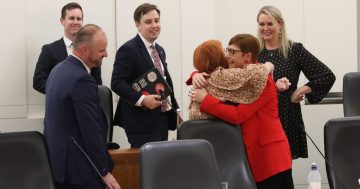
Senator Zed Seselja’s decision not to support a territory rights bill has copped plenty of criticism. Photo: File
Comment and controversy continue to rage over Senator Zed Seselja’s decision not to support a private members’ bill being put forward by Northern Territory Senator Sam McMahon.
The senator, who lost her CLP pre-selection to Alice Springs deputy mayor Jacinta Price, wanted to make a parting gesture with a bill that would have allowed the two territories to legislate on voluntary assisted dying.
But what’s the basis for the ban on legislation around euthanasia in the ACT?
The Howard Government stripped both territories of the right under the Euthanasia Laws Act 1997, commonly known as the Andrews bill, after the NT had attempted to legislate on euthanasia.
When that legislation passed in 1997, it also blocked an attempt by the ACT Legislative Assembly to introduce a similar scheme. Several attempts have been made to dismantle the legislation, including the Restoring Territory Rights (Assisted Suicide Legislation) Bill, which spent three years in limbo from 2015 onwards.
In the interim, a number of Australian states have passed legislation concerning voluntary assisted dying, often after prolonged and impassioned debates and via conscience votes in the state houses. However, the ACT cannot move forward.
Canberra-based constitutional law expert Professor George Williams, the Anthony Mason Professor of Law and Scientia Professor at UNSW, says that there’s nothing other than political will standing between the people of the ACT and their right to make their own laws around voluntary assisted dying.
“Essentially, this is a political call, not a major constitutional matter,” Professor Williams told Region Media.
“The 1997 legislation means the territories have a second-class status within the federation. They are subject to Commonwealth control and override in a way the states are not under Section 122 of the constitution. That allows the federal parent to make whatever laws it wants for the territories, and in the case of euthanasia, that’s what it’s done.”
Professor Williams says changing the legislation around the territories’ right to legislate on euthanasia is a simple matter, describing the McMahon bill as “a sensible and long-overdue piece of legislation”.
He’s dismissive of the argument that the Andrews bill was necessary because the ACT does not have an upper house of review to consider euthanasia legislation, pointing out that Queensland is also a unicameral system.
“Senator Seselja can make a judgement call about both euthanasia but also whether Canberrans should have the same democratic rights as the rest of the country,” he says.
“It makes no sense that you cross into Queanbeyan and people can make their own decisions but not on the Canberra side of the border. Canberrans are not any less capable of governing themselves than every other Australian”.
Recently, ACT Labor and Greens politicians, and Opposition Leader Elizabeth Lee on behalf of the Canberra Liberals, signed a letter to all Australian MPs and Senators alerting them to the Legislative Assembly’s unanimous motion calling for their right to legislate on voluntary assisted dying to be restored.
“I have made the views of the Canberra Liberals Legislative Assembly team very clear to Senator Seselja and will continue to discuss this matter with him and other federal colleagues.
“The ACT Legislative Assembly is democratically elected by the people of Canberra. It should have the right to legislate on this matter on behalf of Canberrans, just as we have the right to legislate on a whole host of other matters dealt with by state and local governments across Australia,” Canberra Liberals leader Elizabeth Lee said.
Professor Williams believes it’s inevitable that the Territory will be given the power to make its own decisions because the arguments for its democratic rights are so strong.
“We are not at that point just yet because it’s unlikely without the support of the ACT’s own senator. But the arguments for giving Canberrans the right to make top their own minds are irresistible”.




















